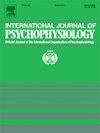Loneliness mediates the association between trait social anxiety and cardiovascular reactivity to acute psychological stress
IF 2.5
3区 心理学
Q3 NEUROSCIENCES
引用次数: 0
Abstract
The primary aims of the current study are (1) to examine the association between trait social anxiety and cardiovascular reactivity to acute psychological stress, and (2) to identify if loneliness significantly mediates the association between trait social anxiety and cardiovascular reactivity. A sample of 658 participants completed a cardiovascular reactivity protocol consisting of a resting baseline and stressor phase (mental arithmetic and Stroop), with systolic blood pressure (SBP), diastolic blood pressure (DBP) and heart rate (HR) monitored throughout. Participants also completed self-reported measures assessing social anxiety and loneliness. Social anxiety was associated with increased self-reported stress. However, no significant associations between social anxiety and measures of cardiovascular reactivity were observed in regression analyses. Loneliness was significantly associated with lower SBP and DBP reactivity. Additionally, loneliness significantly mediated the association between trait social anxiety and both SBP reactivity and DBP reactivity. Here, trait social anxiety predicted greater levels of loneliness, which in turn was associated with diminished cardiovascular reactivity. No significant associations emerged for HR reactivity. These blunted blood pressure responses to acute stress may indicate a potential mechanism leading to adverse prospective health outcomes.
孤独在特质社交焦虑和心血管对急性心理应激反应之间起中介作用。
本研究的主要目的是:(1)研究特质社交焦虑与心血管急性心理应激反应之间的关系;(2)确定孤独感是否在特质社交焦虑与心血管反应之间具有显著的中介作用。658名参与者完成了由静息基线和应激期(心算和Stroop)组成的心血管反应性方案,并全程监测收缩压(SBP)、舒张压(DBP)和心率(HR)。参与者还完成了评估社交焦虑和孤独感的自我报告。社交焦虑与自我报告的压力增加有关。然而,在回归分析中没有观察到社交焦虑和心血管反应性之间的显著关联。孤独感与较低的收缩压和舒张压反应性显著相关。此外,孤独感在特质社交焦虑与收缩压反应性和舒张压反应性之间具有显著的中介作用。在这里,特质社交焦虑预示着更高水平的孤独感,而孤独感反过来又与心血管反应减弱有关。人力资源反应性无显著相关性。这些钝化的血压对急性应激的反应可能表明导致不良预期健康结果的潜在机制。
本文章由计算机程序翻译,如有差异,请以英文原文为准。
求助全文
约1分钟内获得全文
求助全文
来源期刊
CiteScore
5.40
自引率
10.00%
发文量
177
审稿时长
3-8 weeks
期刊介绍:
The International Journal of Psychophysiology is the official journal of the International Organization of Psychophysiology, and provides a respected forum for the publication of high quality original contributions on all aspects of psychophysiology. The journal is interdisciplinary and aims to integrate the neurosciences and behavioral sciences. Empirical, theoretical, and review articles are encouraged in the following areas:
• Cerebral psychophysiology: including functional brain mapping and neuroimaging with Event-Related Potentials (ERPs), Positron Emission Tomography (PET), Functional Magnetic Resonance Imaging (fMRI) and Electroencephalographic studies.
• Autonomic functions: including bilateral electrodermal activity, pupillometry and blood volume changes.
• Cardiovascular Psychophysiology:including studies of blood pressure, cardiac functioning and respiration.
• Somatic psychophysiology: including muscle activity, eye movements and eye blinks.

 求助内容:
求助内容: 应助结果提醒方式:
应助结果提醒方式:


